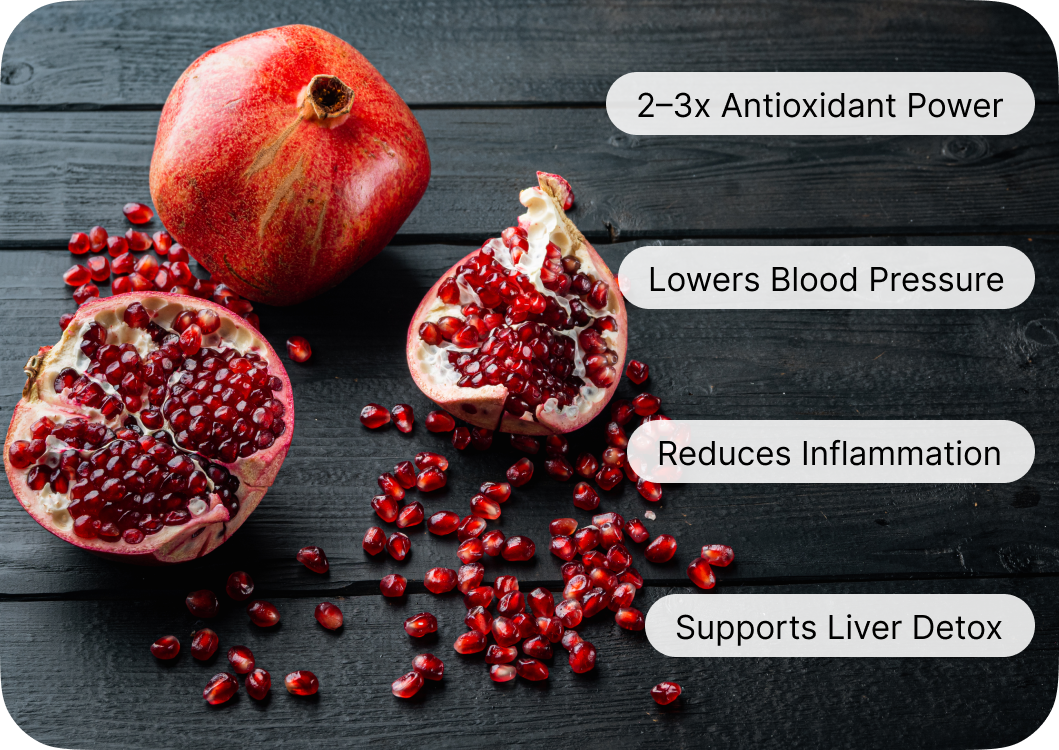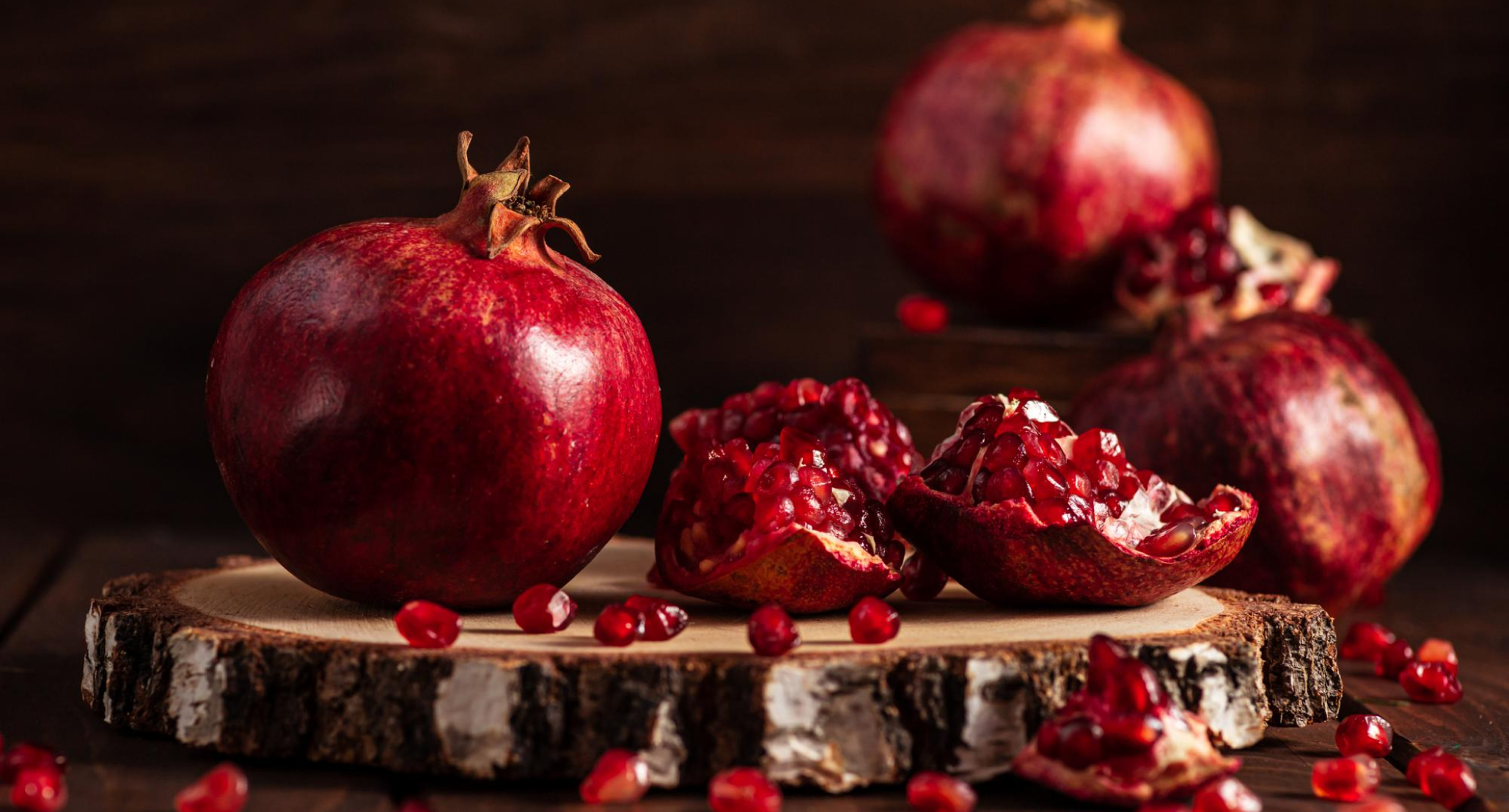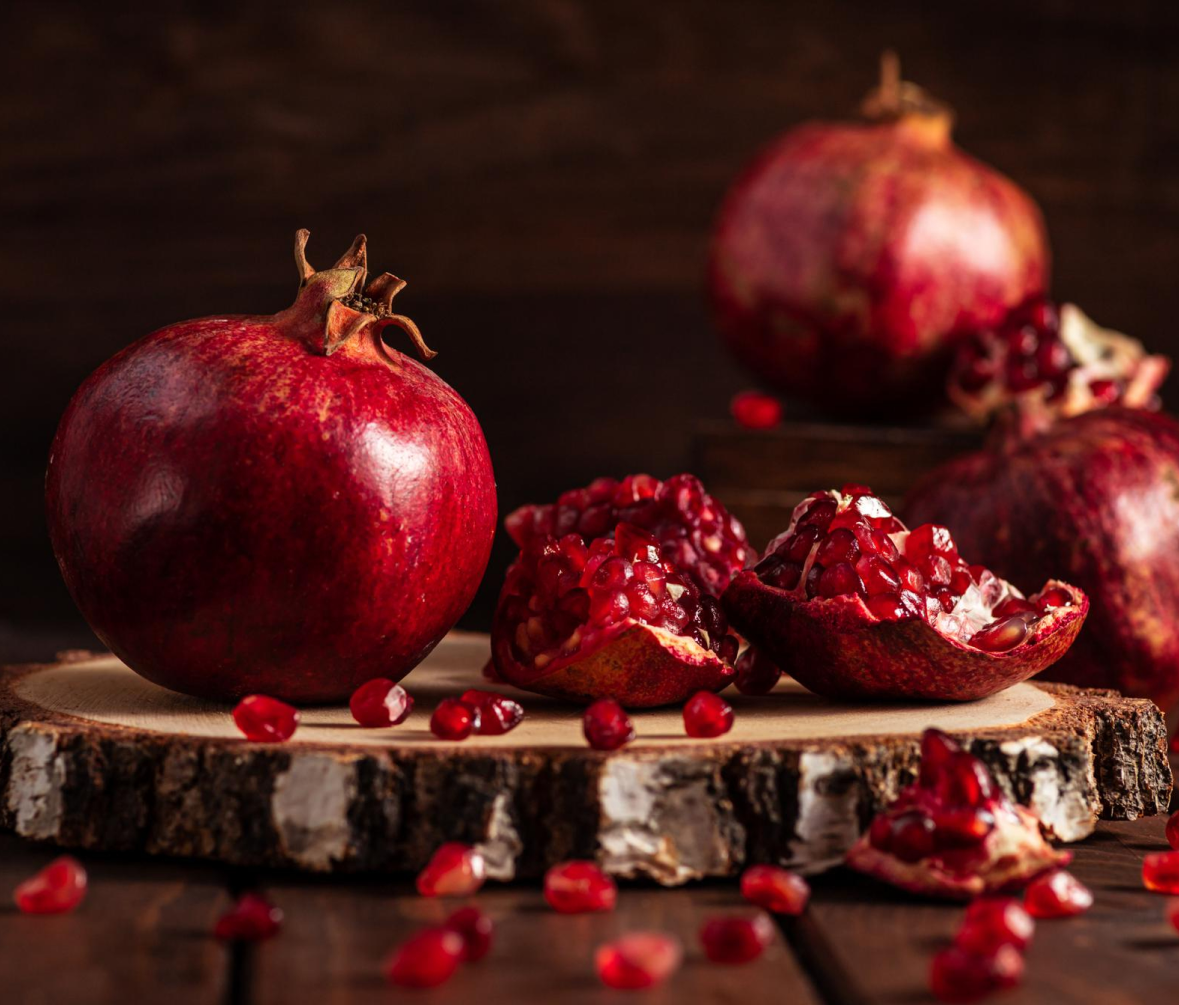Chronic alcohol consumption places significant stress on the cardiovascular system and depletes the body's natural antioxidant defenses, leading to increased inflammation, elevated blood pressure, and cellular damage throughout the body. As you reduce or eliminate alcohol, supporting your heart health and replenishing antioxidant stores becomes crucial for optimal recovery and long-term wellness.
Pomegranate, often called a "superfruit" due to its exceptional nutrient density, has been revered for its medicinal properties for thousands of years. Modern research confirms what ancient cultures intuited - pomegranate contains an extraordinary concentration of bioactive compounds that specifically target cardiovascular health and oxidative stress. For those on an alcohol reduction journey, pomegranate provides targeted support for repairing alcohol-related damage while building resilience against future health challenges through its powerful antioxidant and cardioprotective properties.
The Science Behind Pomegranate for Heart Health and Antioxidant Protection
Pomegranate's cardiovascular and antioxidant benefits stem from its unique combination of bioactive compounds, making it particularly valuable during alcohol recovery:
- Reducing blood pressure and improving arterial function. A comprehensive 2017 meta-analysis published in Pharmacological Research analyzed 8 randomized controlled trials and found that pomegranate consumption significantly reduces both systolic and diastolic blood pressure [2]. Participants consuming pomegranate juice or extract for 4-12 weeks showed average reductions of 4.96 mmHg in systolic and 2.01 mmHg in diastolic pressure. The study attributed these effects to pomegranate's high concentration of nitric oxide-boosting compounds, which help relax blood vessels and improve circulation—particularly important for those recovering from alcohol's constrictive effects on blood vessels.
- Providing superior antioxidant protection and reducing inflammation. Research published in the Journal of Nutritional Biochemistry demonstrated that pomegranate extract contains antioxidant activity 2-3 times higher than red wine or green tea [3]. In a 12-week study, participants consuming pomegranate juice showed 90% increases in plasma antioxidant activity and significant reductions in inflammatory markers including C-reactive protein and interleukin-6 [4]. This powerful antioxidant protection is crucial during alcohol reduction, as it helps neutralize the free radicals generated during alcohol metabolism while supporting cellular repair processes.
- Supporting liver detoxification and cellular regeneration. The liver bears the primary burden of alcohol metabolism, often becoming damaged through chronic exposure. A 2019 study in Food & Function found that pomegranate's ellagic acid and punicalagins significantly enhance liver detoxification enzymes while protecting hepatocytes (liver cells) from oxidative damage [5]. Participants with mild liver dysfunction showed improved liver enzyme levels and reduced markers of liver inflammation after consuming pomegranate extract for 8 weeks, suggesting this superfruit actively supports liver recovery during alcohol reduction.
- Enhancing endothelial function and cardiovascular recovery. The endothelium, the inner lining of blood vessels, is particularly vulnerable to alcohol-induced damage. Research in Clinical Nutrition demonstrated that pomegranate consumption improves endothelial function by increasing nitric oxide production and reducing oxidative stress in blood vessel walls [6]. Study participants showed 30% improvements in flow-mediated dilation (a measure of blood vessel health) after consuming pomegranate juice for 4 weeks, indicating significant cardiovascular recovery potential for those reducing alcohol consumption.

Practical Tips for Incorporating Pomegranate
To maximize the heart health and antioxidant benefits of pomegranate during your alcohol reduction journey, consider these evidence-based approaches:
- Choose 100% pure pomegranate juice without added sugars. Look for juice that contains at least 600mg of polyphenols per 8-ounce serving for optimal therapeutic benefits. Consume 4-8 ounces daily, preferably in the morning to provide sustained antioxidant protection throughout the day. Dilute with water if the taste is too intense or to reduce natural sugar content.
- Incorporate fresh pomegranate arils into meals and snacks. Add pomegranate seeds to salads, yogurt, oatmeal, or smoothies to benefit from the fiber and additional nutrients found in the whole fruit. One cup of arils provides approximately 400mg of polyphenols plus beneficial fiber that supports digestive health during recovery.
- Consider standardized pomegranate extract supplements. For consistent dosing and maximum potency, look for supplements standardized to 40% ellagic acid or containing 500-1000mg of pomegranate polyphenols per serving. Take with meals to enhance absorption and reduce potential digestive sensitivity.
- Create heart-healthy pomegranate smoothies. Blend pomegranate juice or arils with other heart-healthy ingredients like berries, leafy greens, and omega-3 rich foods such as ground flaxseed or walnuts. This combination amplifies the cardiovascular benefits while creating a satisfying, nutritious meal replacement.
- Time consumption strategically for maximum benefit. Research suggests consuming pomegranate in the morning provides optimal antioxidant protection throughout the day [7]. For those with elevated blood pressure, splitting intake between morning and evening may provide more consistent cardiovascular support.
Side Effects and Precautions
While pomegranate is generally safe for most people, there are important considerations to keep in mind:
- Digestive sensitivity and natural sugar content. Pomegranate juice and supplements may cause mild digestive upset, including nausea or diarrhea, particularly when first introduced. The natural sugar content in pomegranate juice can also affect blood glucose levels, so individuals with diabetes should monitor their response and consider diluting juice or choosing fresh arils instead.
- Medication interactions. Pomegranate can interact with certain medications, particularly blood thinners like warfarin, blood pressure medications, and statins [8]. The fruit's compounds may enhance the effects of these medications, potentially leading to excessive blood thinning or blood pressure reduction. Always consult your healthcare provider if you're taking prescription medications.
- Allergic reactions. Some individuals may experience allergic reactions to pomegranate, including skin rashes, itching, or difficulty breathing. If you have known allergies to other fruits or tree nuts, introduce pomegranate gradually and monitor for any adverse reactions.
- Quality and processing considerations. Not all pomegranate products contain therapeutic levels of active compounds. Choose products that specify polyphenol content and avoid those with excessive added sugars or artificial ingredients that could counteract the health benefits.
- Caloric considerations during recovery. Pomegranate juice contains natural sugars and calories that should be considered as part of your overall nutritional plan. If weight management is a concern during alcohol reduction, opt for fresh arils or diluted juice to maintain benefits while controlling caloric intake.
- If you have cardiovascular conditions, diabetes, are taking prescription medications, or have concerns about adding pomegranate to your routine, consult with your healthcare provider for personalized guidance.
Summing Up
Pomegranate offers exceptional heart health and antioxidant benefits that directly support recovery during alcohol reduction. Through its potent polyphenol content and unique bioactive compounds, pomegranate helps repair cardiovascular damage, reduce inflammation, and support liver detoxification—addressing many of the health challenges created by chronic alcohol consumption. The cardiovascular protective effects and superior antioxidant activity of pomegranate provide both immediate support for your body's recovery processes and long-term protection for continued health. Incorporating this powerful superfruit into your daily routine creates a foundation of cellular protection and cardiovascular wellness that supports your alcohol reduction goals while promoting lasting vitality and health.













